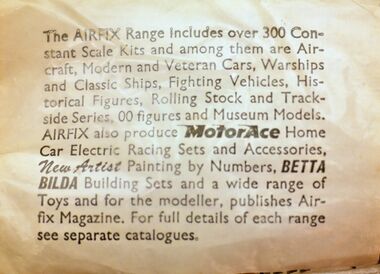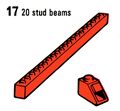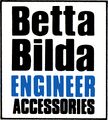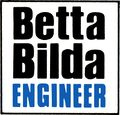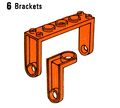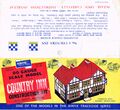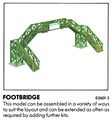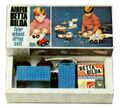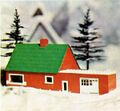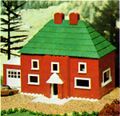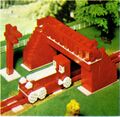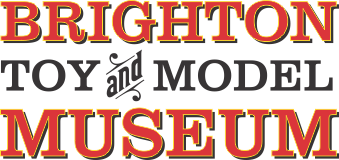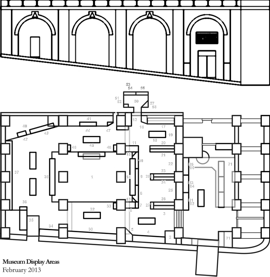Category:Airfix: Difference between revisions
(tweaked) |
(+date) |
||
| Line 1: | Line 1: | ||
{{stub}} | {{stub}} | ||
{{Toymaker}} | {{Toymaker|Date1=1939}} | ||
{{Box|Airfix_(GaT_1956).jpg|Airfix trade advert, 1956. Note the number of product ranges other than construction kits.|280}} | {{Box|Airfix_(GaT_1956).jpg|Airfix trade advert, 1956. Note the number of product ranges other than construction kits.|280}} | ||
{{Box|The_AIRFIX_Range,_insert.jpg|"The AIRFIX Range", paper insert|380}} | {{Box|The_AIRFIX_Range,_insert.jpg|"The AIRFIX Range", paper insert|380}} | ||
| Line 7: | Line 7: | ||
==Origins== | ==Origins== | ||
Although the name is now synonymous with model aircraft kits, and it would be reasonable to assume that this is what the name stood for ("air-fix"), the name was actually a reference to the air-filled rubber building blocks (and toy ducks and other novelties) that the company originally produced. | |||
In 1949 the company produced a moulded acetate model tractor as a promotional item for the Ferguson tractor company, and then started selling the parts through Woolworths, unassembled, as kits. | In 1949 the company produced a moulded acetate model tractor as a promotional item for the Ferguson tractor company, and then started selling the parts through Woolworths, unassembled, as kits. | ||
Revision as of 11:58, 24 February 2016
| Toy Brands and Manufacturers |
|---|
Airfix |
| 1939 - |
Airfix trade advert, 1956. Note the number of product ranges other than construction kits. [image info]
"The AIRFIX Range", paper insert [image info]
Airfix Kits, Shire Library [image info]
Airfix was founded in 1939 by Nicholas Kove, to make hollow rubber toys and novelties, and when rubber became scarce because of wartime demand for tyres for military vehicles, Kove switched to using plastics, and then to injection moulding.
Origins
Although the name is now synonymous with model aircraft kits, and it would be reasonable to assume that this is what the name stood for ("air-fix"), the name was actually a reference to the air-filled rubber building blocks (and toy ducks and other novelties) that the company originally produced.
In 1949 the company produced a moulded acetate model tractor as a promotional item for the Ferguson tractor company, and then started selling the parts through Woolworths, unassembled, as kits.
Airfix "Cutty Sark" ship, polybag construction kit [image info]
In 1952, this was followed by a "proper" moulded polystyrene kit of the Golden Hind ship, and then the first Airfix model aircraft kit - a Spitfire Mk1 - in 1953.
However, the roaring success of these "poly-bagged" kits didn't immediately take over the company's whole output - a 1956 trade advert lists "construction kits" as the second entry for the company's output, after "polythene tea-sets"!
The list goes on to mention "beach lines", "games" and "novelties, etc. etc".
External links
Books
- Trevor Pask, Airfix Kits (Shire Library) ISBN 0747807914
- James May with Ian Harrison, James May's Toy Stories (Anova, 2009) ISBN 1844861074 pages 128-169
Subcategories
This category has the following 19 subcategories, out of 19 total.
A
- Airfix Magazine (4 F)
- Airfix Motor Racing (14 F)
B
- Betta Bilda Big Bricks (5 F)
- Betta Bilda Big Trucks (1 F)
- Betta Bilda Building Sets (1 P, 15 F)
- Betta Bilda Engineer (4 P, 26 F)
- Betta Bilda Engineer Accessories (2 P, 11 F)
- Betta Bilda models (1 P, 30 F)
- Betta Bilda Motor Units (2 P, 16 F)
- Bleriot to Concorde (display) (12 P, 2 F)
- Airfix Building Sets (4 P, 14 F)
K
M
- Airfix Museum Models (1 P, 2 F)
R
- Airfix Railway System (25 F)
- Rosebud Kitmaster Ltd (5 P, 39 F)
T
- Teeny Trucks (Betta Bilda) (2 P, 1 F)
- Airfix Trackside Series (1 P, 16 F)
Pages in category ‘Airfix’
The following 17 pages are in this category, out of 17 total.
B
T
Media in category ‘Airfix’
The following 200 files are in this category, out of 253 total.
(previous page) (next page)- 12 Ton Ventilated Goods Van, Airfix 54300-4 (AirfixRS 1976).jpg 1,292 × 1,033; 659 KB
- 20 Ton Brake Van GWR (Airfix Railway System 54363-5).jpg 1,600 × 906; 756 KB
- 20 Ton Goods Brake Van, Airfix 54360-6 (AirfixRS 1976).jpg 1,605 × 1,050; 785 KB
- 20-Stud Beam, Betta Bilda (BBM 1968).jpg 1,138 × 1,200; 208 KB
- 25 Ton Machine Wagon Lowmac, Airfix 54330-5 (AirfixRS 1976).jpg 1,711 × 923; 630 KB
- 2nd North British Dragoon (Scots Greys) 1815, model kit (Airfix).jpg 1,092 × 1,800; 1.03 MB
- 4WD Betta Bilda Motor, box artwork.jpg 3,000 × 1,996; 1.21 MB
- Accessory Pack 1, Betta Bilda (BettaBilda 1968).jpg 1,350 × 1,250; 122 KB
- Accessory Pack 10, Betta Bilda (BettaBilda 1968).jpg 1,350 × 1,250; 151 KB
- Accessory Pack 11, Betta Bilda (BettaBilda 1968).jpg 1,350 × 1,250; 96 KB
- Accessory Pack 12, Betta Bilda (BettaBilda 1968).jpg 1,350 × 1,250; 143 KB
- Accessory Pack 13, Betta Bilda (BettaBilda 1968).jpg 1,350 × 1,250; 185 KB
- Accessory Pack 14, Betta Bilda (BettaBilda 1968).jpg 1,350 × 1,250; 160 KB
- Accessory Pack 15, Betta Bilda (BettaBilda 1968).jpg 1,350 × 1,250; 118 KB
- Accessory Pack 16, Betta Bilda (BettaBilda 1968).jpg 1,350 × 1,250; 148 KB
- Accessory Pack 17, Betta Bilda (BettaBilda 1968).jpg 1,350 × 1,250; 104 KB
- Accessory Pack 18, Betta Bilda (BettaBilda 1968).jpg 1,350 × 1,250; 145 KB
- Accessory Pack 19, Betta Bilda (BettaBilda 1968).jpg 2,700 × 1,250; 459 KB
- Accessory Pack 2, Betta Bilda (BettaBilda 1968).jpg 1,350 × 1,250; 90 KB
- Accessory Pack 3, Betta Bilda (BettaBilda 1968).jpg 1,350 × 1,250; 145 KB
- Accessory Pack 4, Betta Bilda (BettaBilda 1968).jpg 1,350 × 1,250; 158 KB
- Accessory Pack 5, Betta Bilda (BettaBilda 1968).jpg 1,350 × 1,250; 176 KB
- Accessory Pack 6, Betta Bilda (BettaBilda 1968).jpg 1,350 × 1,250; 123 KB
- Accessory Pack 7, Betta Bilda (BettaBilda 1968).jpg 1,350 × 1,250; 164 KB
- Accessory Pack 8, Betta Bilda (BettaBilda 1968).jpg 1,350 × 1,250; 164 KB
- Accessory Pack 9, Betta Bilda (BettaBilda 1968).jpg 1,350 × 1,250; 136 KB
- Accessory packs (Airfix Betta Bilda).jpg 2,200 × 1,763; 2.19 MB
- Accessory Packs (BettaBilda 1968).jpg 3,000 × 2,200; 1.34 MB
- Accessory packs, Airfix Building Sets (AirfixBSIB ~1959).jpg 2,085 × 1,466; 1.45 MB
- Adaptors, Betta Bilda Engineer Accessories Pack 5 (1969).jpg 1,600 × 1,437; 179 KB
- Aeroplane diagram, Betta Bilda Engineer (BettaBilda 1968).jpg 3,000 × 2,174; 549 KB
- Aeroplane, BettaBilda Engineer Set E1 (BettaBilda 1968).jpg 802 × 1,200; 215 KB
- Airfix (GaT 1956).jpg 1,021 × 1,600; 143 KB
- Airfix - Products in Plastics, logo.jpg 1,400 × 850; 142 KB
- Airfix 00 gauge Construction Kits (HobbiesCat 1959).jpg 3,000 × 1,223; 1.02 MB
- Airfix 1-72 Halifax Bomber, advert (Aeromodeller 1964).jpg 826 × 1,200; 424 KB
- Airfix 1-72 Halifax Bomber, advert (AMA 1964).jpg 826 × 1,200; 132 KB
- Airfix Betta Bilda Instruction Book (ABB ~1962).jpg 2,200 × 1,484; 2.9 MB
- Airfix Betta Builder (Hobbies 1968).jpg 2,022 × 941; 571 KB
- Airfix Building Set Instruction Book, cover, early (AirfixBSIB ~1957).jpg 3,000 × 1,903; 1.7 MB
- Airfix Building Set, Instruction Book, (AirfixBSIB ~1959).jpg 2,200 × 1,436; 1.85 MB
- Airfix Building Sets (Hobbies 1959).jpg 1,406 × 1,031; 412 KB
- Airfix Check List - Have You Got Them All Yet, yellow slip (1960).jpg 1,024 × 652; 480 KB
- Airfix Construction Kits (Hobbies 1958).jpg 1,219 × 1,600; 811 KB
- Airfix Construction Kits (Hobbies 1959).jpg 1,664 × 2,200; 1.22 MB
- Airfix Construction Kits (Hobbies 1960).jpg 1,238 × 1,600; 818 KB
- Airfix Construction Kits (Hobbies 1961).jpg 1,223 × 1,600; 755 KB
- Airfix Construction Kits (Hobbies 1962).jpg 1,734 × 2,200; 1.16 MB
- Airfix Construction Kits (Hobbies 1965).jpg 1,242 × 1,600; 747 KB
- Airfix Construction Kits (Hobbies 1966).jpg 1,235 × 1,600; 782 KB
- Airfix Construction Kits (Hobbies 1967).jpg 1,244 × 1,600; 1.01 MB
- Airfix Construction Kits (Hobbies 1968).jpg 1,211 × 1,600; 969 KB
- Airfix Couplings, box.jpg 800 × 504; 95 KB
- Airfix Cutty Sark original.jpg 1,600 × 792; 412 KB
- Airfix FAL FN Herstal 30inch Rifle, Gamages (MM 1961-07).jpg 2,041 × 997; 486 KB
- Airfix Kits, Trevor Pask, 0747807914 (Shire Library).jpg 844 × 1,200; 152 KB
- Airfix logo (1958).jpg 1,500 × 480; 121 KB
- Airfix logo (Hobbies 1961).jpg 1,400 × 640; 246 KB
- Airfix Magazine, advert (MM 1967-07).jpg 1,873 × 2,400; 1.14 MB
- Airfix Magazine, front cover, April 1976 (AirfixMag 1976-04).jpg 850 × 1,200; 546 KB
- Airfix Magazine, front cover, May 1962 (AirfixMag 1962-05).jpg 1,309 × 2,000; 1.43 MB
- Airfix Modellers Club, paper slip.jpg 1,200 × 920; 240 KB
- Airfix Motor Racing Set, advert crop (RM 1962-12).jpg 1,889 × 1,338; 937 KB
- Airfix Motor Racing, logo (AirfixMag 1966).jpg 1,200 × 921; 150 KB
- Airfix Motor Racing, MR125 box, lineart (AirfixMag 1966-01).jpg 1,488 × 1,525; 790 KB
- Airfix Motor Racing, set MR11, lineart (Hobbies 1968).jpg 2,730 × 2,001; 1.43 MB
- Airfix MotorAce, logo.jpg 1,729 × 578; 130 KB
- Airfix MRRC racing (AirfixMag 1976-03).jpg 769 × 1,024; 236 KB
- Airfix MRRC, For The Specialist (AirfixMag 1968-04).jpg 802 × 1,024; 325 KB
- Airfix Railway System (AirfixRS 1976).jpg 2,819 × 850; 305 KB
- Airfix Railway System, 1976 catalogue (AirfixRS 1976).jpg 3,000 × 2,110; 4.58 MB
- Airfix Railway System, 1976 catalogue, rear cover (AirfixRS 1976).jpg 3,000 × 2,153; 1.9 MB
- Airfix range (Hobbies 1968).jpg 1,702 × 2,200; 1.11 MB
- Airfix Range, paper slip.jpg 1,200 × 978; 401 KB
- Airfix Road Racing, Beatties (AirfixMag 1964-12).jpg 931 × 1,200; 401 KB
- Airfix scroll logo (1963).jpg 3,000 × 435; 201 KB
- Airfix Veteran Cars (MMM 1964).jpg 1,600 × 1,037; 743 KB
- Angel Interceptor kit, Captain Scarlet, box (Airfix A02086).jpg 1,200 × 699; 657 KB
- Apollo Saturn V kit, box detail (Airfix 09170 4).jpg 1,200 × 436; 71 KB
- Apollo Saturn V kit, box end (Airfix 09170 4).jpg 1,800 × 491; 161 KB
- Apollo Saturn V kit, box lid (Airfix 09170 4).jpg 1,940 × 3,000; 1.1 MB
- Apollo Saturn V kit, contents (Airfix 09170).jpg 2,000 × 1,289; 414 KB
- Apollo Saturn V kit, instructions (Airfix 09170).jpg 1,200 × 709; 234 KB
- Base, Betta Bilda Engineer Accessories Pack 7 (1969).jpg 1,600 × 1,437; 245 KB
- Bases, Airfix Betta Bilda (ABBins 1960s).jpg 1,227 × 798; 253 KB
- Beam Engine Kit, box lid (Airfix Museum Models).jpg 1,800 × 1,118; 2.03 MB
- Betta Bilda - The Integrated Building System (BettaBilda 1968).jpg 3,000 × 1,067; 326 KB
- Betta Bilda Big Bricks Set (BettaBilda 1968).jpg 1,200 × 571; 139 KB
- Betta Bilda Building Sets, leaflet (BettaBilda 1968).jpg 2,080 × 3,000; 1,019 KB
- Betta Bilda Engineer Accessories, logo.jpg 1,589 × 1,760; 190 KB
- Betta Bilda Engineer Accessories.jpg 1,200 × 1,172; 287 KB
- Betta Bilda Engineer Set E1 (BettaBilda 1968).jpg 1,200 × 636; 165 KB
- Betta Bilda Engineer Set E2 (BettaBilda 1968).jpg 1,200 × 669; 169 KB
- Betta Bilda Engineer, logo.jpg 1,589 × 1,518; 152 KB
- Betta Bilda Engineer, pack 7 end artwork.jpg 2,000 × 663; 188 KB
- Betta Bilda Motor Units (BBM 1968).jpg 2,153 × 2,200; 988 KB
- Betta Bilda Set 1 (BettaBilda 1968).jpg 1,200 × 1,072; 269 KB
- Betta Bilda Set 2 (BettaBilda 1968).jpg 1,200 × 828; 207 KB
- Betta Bilda Set 3 (BettaBilda 1968).jpg 1,200 × 685; 166 KB
- Betta Bilda Set 4 (BettaBilda 1968).jpg 1,200 × 736; 170 KB
- Betta Bilda Set No1, box lid (Airfix).jpg 1,590 × 1,800; 592 KB
- Betta Bilda, The Integrated Building System (1969).jpg 3,000 × 1,992; 621 KB
- BettaBilda Wall Units, Accessory Pack 14, leaflet (Airfix).jpg 1,516 × 2,200; 885 KB
- Bicycle, BettaBilda Engineer Set E1 (BettaBilda 1968).jpg 1,200 × 852; 240 KB
- Big Bricks Set A, Betta Bilda (BettaBilda 1968).jpg 1,200 × 864; 249 KB
- Big Bricks, Betta Bilda (1969).jpg 1,600 × 1,063; 273 KB
- Big Trucks, Betta Bilda (1969).jpg 1,600 × 1,216; 366 KB
- Biggin Hill 4-6-2 locomotive BR 34057, Series5 Airfix kit 05651 (AirfixRS 1976).jpg 3,000 × 1,458; 2.08 MB
- Biplane built with BettaBilda Engineer Set E1 (BettaBilda 1968).jpg 1,200 × 841; 206 KB
- Blackburn Buccaneer, model kit, box lid (Airfix 384).jpg 1,800 × 812; 1.05 MB
- Booking Hall, Series1 Airfix kit 01609 (AirfixRS 1976).jpg 1,453 × 1,576; 749 KB
- BR Diesel Mixed Freight Train Set, Airfix Railway System 54055-7 (AirfixRS 1976).jpg 3,000 × 2,116; 3.26 MB
- BR Inter-City Brake Second Open Mk2D Coach, Airfix 54200-5 (AirfixRS 1976).jpg 2,921 × 1,104; 1.72 MB
- BR Inter-City First Open Mk2D Coach, Airfix 54201-8 (AirfixRS 1976).jpg 2,923 × 1,137; 1.76 MB
- BR Steam Goods Train Set, Airfix Railway System 54057-3 (AirfixRS 1976).jpg 3,000 × 2,109; 2.92 MB
- Brackets, Betta Bilda Engineer Accessories Pack 6 (1969).jpg 1,600 × 1,437; 164 KB
- Brake Van, plastic construction kit, box lid (Airfix R4 02658).jpg 1,600 × 1,083; 813 KB
- Brake Van, Series2 Airfix kit 02658 (AirfixRS 1976).jpg 1,485 × 1,477; 957 KB
- Brick adaptors, Betta Bilda Engineer (BettaBilda 1968).jpg 3,000 × 1,248; 377 KB
- Bucketful of Bricks, Betta Bilda (BettaBilda 1968).jpg 1,124 × 1,200; 219 KB
- Building Accessories and Lockbricks packs, for Airfix Building Sets (AirfixBSIB ~1957).jpg 1,600 × 1,117; 1.24 MB
- Building Set Accessories (Airfix Betta Bilda).jpg 1,766 × 2,381; 867 KB
- Bullfinches, Airfix Wildlife Series, box lid (Airfix 03830).jpg 1,800 × 919; 1.27 MB
- Bungalow, Airfix Betta Bilda (ABBins 1960s).jpg 1,885 × 1,599; 1.04 MB
- Castle Keep, Airfix Betta Bilda (ABBins 1960s).jpg 1,678 × 1,573; 1.02 MB
- Cattle Wagon, plastic construction kit, box lid (Airfix R5 02659).jpg 1,600 × 1,082; 948 KB
- Cattle Wagon, Series2 Airfix kit 02659 (AirfixRS 1976).jpg 1,458 × 1,309; 779 KB
- Cement Wagon, plastic construction kit, box lid (Airfix R2 02662).jpg 1,600 × 1,081; 876 KB
- Central Pacific Jupiter 4-4-0 Steam Locomotive, Airfix 54170-5 (AirfixRS 1976).jpg 2,457 × 1,140; 986 KB
- Church, Airfix Betta Bilda (ABBins 1960s).jpg 2,039 × 1,923; 1.26 MB
- Church, BettaBilda Set 1 (BettaBilda 1968).jpg 1,200 × 1,192; 337 KB
- City of Truro 4-4-0 locomotive BR 3440, Series4 Airfix kit 04654 (AirfixRS 1976).jpg 3,000 × 1,395; 1.67 MB
- Class 31 Diesel Locomotive BR D5531, Airfix 54101-9 (AirfixRS 1976).jpg 2,874 × 1,170; 1.59 MB
- Class 31-4 Diesel Locomotive BR 31401, Airfix 54100-6 (AirfixRS 1976).jpg 2,940 × 1,206; 1.59 MB
- Complaint Slip promoting Airfix Magazine (Airfix).jpg 1,200 × 818; 733 KB
- Cottage, Starter Set, Airfix Betta Bilda (ABBins 1960s).jpg 2,064 × 2,043; 1.51 MB
- Country Inn (Airfix Trackside 4001).jpg 2,200 × 2,021; 3.35 MB
- Crane Accessory Pack, Betta Bilda (BBM 1968).jpg 824 × 1,200; 252 KB
- Crane model, motorised, Betta Bilda (BBM 1968).jpg 1,005 × 1,200; 208 KB
- Detached House (Airfix Trackside 2).jpg 2,200 × 2,036; 3.11 MB
- Detached House (Airfix Trackside 4002).jpg 2,200 × 2,019; 3.13 MB
- Detached House (Airfix Trackside Series No2).jpg 1,800 × 767; 438 KB
- Detached House and Garage, Airfix Betta Bilda (ABBins 1960s).jpg 1,925 × 1,389; 1.37 MB
- Detached House and Garage, No1 Set, Airfix Betta Bilda (ABBins 1960s).jpg 1,850 × 1,706; 1.01 MB
- Detached House, 00 construction kit, bagged (Airfix Trackside 4002).jpg 966 × 1,024; 932 KB
- Diesel Shunter D2300, Airfix (RM 1963-01).jpg 2,351 × 3,000; 2.92 MB
- Doors and Windows, Airfix Betta Bilda (ABBins 1960s).jpg 1,227 × 855; 456 KB
- Dr X Adventure Train Set, Airfix Railway System 54052-8 (AirfixRS 1976).jpg 3,000 × 1,055; 2.16 MB
- Engine Shed, Series2 Airfix kit 02608 (AirfixRS 1976).jpg 1,453 × 1,651; 1.19 MB
- Esso Class B Tank Wagon, Series2 Airfix kit 02656 (AirfixRS 1976).jpg 1,474 × 1,476; 896 KB
- Evening Star locomotive BR 92220, Series5 Airfix kit 05652 (AirfixRS 1976).jpg 3,000 × 1,402; 2.03 MB
- F-4B Phantom II, model kit, box lid (Airfix 388).jpg 1,800 × 805; 1.24 MB
- Factory Building with plastic roof, Airfix Building Set No3 (AirfixBSIB ~1959).jpg 3,000 × 1,370; 1.41 MB
- Farmyard, Airfix Building Sets (AirfixBSIB ~1957).jpg 2,200 × 1,083; 726 KB
- Fencing and Gates, Series1 Airfix kit 01617 (AirfixRS 1976).jpg 1,447 × 1,568; 494 KB
- Fire Engine, Betta Bilda 4WD Motor (BettaBilda 1968).jpg 1,200 × 1,095; 292 KB
- Fitting Roof Tiles (AirfixBSIB ~1959).jpg 1,808 × 1,156; 395 KB
- Footbridge, Series2 Airfix kit 02601 (AirfixRS 1976).jpg 1,468 × 1,573; 624 KB
- Forklift Truck, BettaBilda Engineer Set E2 (BettaBilda 1968).jpg 768 × 1,200; 223 KB
- Formula 1 BRM racing car, Airfix Clubman range (MM 1966-10).jpg 1,475 × 2,000; 1.59 MB
- Four Wheel Drive Motor, Betta Bilda (BettaBilda 1968).jpg 1,200 × 1,187; 300 KB
- Four Wheel Drive Motor, box+, Betta Bilda (BettaBilda 1968).jpg 1,048 × 1,200; 216 KB
- Four Wheel Drive Motor, box, Betta Bilda (BettaBilda 1968).jpg 1,200 × 1,083; 247 KB
- Gable Ends, Airfix Betta Bilda (ABBins 1960s).jpg 1,227 × 800; 208 KB
- Garage, Airfix Betta Bilda (ABBins 1960s).jpg 1,760 × 1,512; 862 KB
- Garage, BettaBilda Set 1 (BettaBilda 1968).jpg 1,195 × 1,200; 357 KB
- Gatekeepers Lodge, Airfix Betta Bilda (ABBins 1960s).jpg 1,904 × 1,844; 1,013 KB
- General Store (Airfix Trackside 4004).jpg 2,200 × 2,015; 3.34 MB
- Girder Bridge, Series2 Airfix kit 02607 (AirfixRS 1976).jpg 1,465 × 1,580; 585 KB
- Great Western Suburban Train Set, Airfix Railway System 54056-0 (AirfixRS 1976).jpg 3,000 × 2,116; 2.99 MB
- GWR Suburban Brake Coach, Airfix 54250-0 (AirfixRS 1976).jpg 2,745 × 1,086; 1.49 MB
- Harrow Schools Class 4-4-0 locomotive SR 919, Series4 Airfix kit 04652 (AirfixRS 1976).jpg 3,000 × 1,343; 1.77 MB
- HMS Cossack plastic construction kit (Airfix).jpg 1,024 × 381; 249 KB
- House, Betta Bilda (1969).jpg 1,600 × 1,368; 425 KB
- House, BettaBilda Set 2 (BettaBilda 1968).jpg 1,200 × 1,113; 260 KB
- House, BettaBilda Set 3 (BettaBilda 1968).jpg 1,200 × 1,160; 283 KB
- How To Lock Bricks Together (AirfixBSIB ~1957).jpg 1,573 × 732; 279 KB
- Industrial buildings with plastic roof, Airfix Building Set No3 (AirfixBSIB ~1959).jpg 3,000 × 1,229; 1.36 MB
- Instructions page, Airfix Building Set (AirfixBSIB ~1957).jpg 2,200 × 1,325; 1,003 KB
- Instructions page, Airfix Building Set (AirfixBSIB ~1959).jpg 2,200 × 1,433; 1.14 MB
- Inter-City Train Set, Airfix Railway System 54054-4 (AirfixRS 1976).jpg 3,000 × 2,116; 3.25 MB
- Interlocking Bricks, Airfix Betta Bilda (ABBins 1960s).jpg 1,227 × 801; 197 KB
- James Mays Toy Stories, cover and spine (ISBN 9781844861071).jpg 1,451 × 1,600; 1.39 MB
- Jill Windmill, Clayton (motorised model).jpg 768 × 1,024; 625 KB
- Just Like The Real Thing, Airfix Motor Racing (AirfixMag 1966-01).jpg 919 × 1,200; 645 KB
- Just Like The Real Thing, Airfix Motor Racing (MM 1964-09).jpg 908 × 1,200; 642 KB
- Just Like The Real Thing, Airfix Motor Racing (MM 1966-10).jpg 2,380 × 3,000; 3.71 MB
- Kiosks and Platform Steps, Series1 Airfix kit 01611 (AirfixRS 1976).jpg 1,468 × 1,588; 1,024 KB
- Large and Medium Beams, Betta Bilda Engineer Accessories Pack 3 (1969).jpg 920 × 1,600; 166 KB
- Level Crossing, Series1 Airfix kit 01615 (AirfixRS 1976).jpg 1,475 × 1,671; 1 MB
- Lifting Bridge model, motorised, Betta Bilda (BBM 1968).jpg 1,005 × 1,200; 229 KB
- Lockbricks concept drawing (Patent GB845986).jpg 1,105 × 878; 110 KB
- Loco and Bridge, BettaBilda Set 3 (BettaBilda 1968).jpg 1,200 × 1,170; 273 KB
- Lorry, Betta Bilda (1969).jpg 1,600 × 1,430; 390 KB
- Meat Van, plastic construction kit, box lid (Airfix R8 02661).jpg 1,600 × 1,077; 868 KB
- Mineral Wagon 16 Ton, Series2 Airfix kit 02657 (AirfixRS 1976).jpg 1,457 × 1,381; 720 KB
- Models built with Betta Bilda Engineer (BettaBilda 1968).jpg 1,200 × 808; 264 KB
- Modern Office Block, Airfix Betta Bilda (ABBins 1960s).jpg 2,043 × 2,128; 1.55 MB
- Mogul 2-6-0 locomotive BR 76093, Series4 Airfix kit 04653 (AirfixRS 1976).jpg 3,000 × 1,449; 1.74 MB

